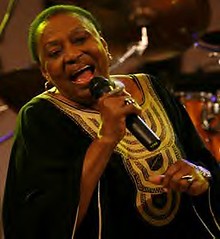
'Mama Africa', Miriam Makeba, performing at her last concert in Naples, Italy on Sunday, November 9, 2008. Makeba was 76 and was widely regarded as making the most profound contribution to the popularization of African music throughout the world.
Originally uploaded by Pan-African News Wire File Photos
By Natasha Senjanovic
Sun Feb 13, 2011 9:17pm EST
BERLIN (Hollywood Reporter) - Director Mika Kaurismaki stitches together archive footage and fresh interviews to pay overdue cinematic homage to legendary South African singer Miriam Makeba in the documentary "Mama Africa"
The documentary was the idea of co-screenwriter and co-producer Don Edkins, and was being developed with Makeba when she died in 2008, at 76.
The worst that can be said about the film is that her presence is sorely missed. The already interesting material on her colorful life would be that much more compelling with her to comment on it.
"Mama Africa" glides over Makeba's poverty-ridden childhood, almost immediately focusing on the beginning of her professional career with the all-girl group The Skylarks, before she was whisked away by more serious jazz bands.
Her bandmates from that era -- Abigail Kubeka of The Skylarks and renowned horn player Hugh Masekela, also Makeba's first husband -- guide us through the period and the Johannesburg township from which Makeba hailed.
Other prominent figures who shed light on Makeba's colorful life include her grandchildren; Beninoise superstar Angelique Kidjo; numerous other musicians; and even Jean-Marie Dore, former prime minister of Guinea and a friend of the singer.
Showing performance footage of only a handful of songs, Kaurismaki and Edkins cram in a fair amount of biographical tidbits without creating an information overload (interested viewers will be Googling for more about Makeba) and uncover her talented daughter Bongi, who died at the age of 35 after writing some of her mother's best-known music.
Makeba's career trajectory was as phenomenal as her personal life was full of tragedy. Her big break came in 1959, after independent American filmmaker Lionel Rogosin included her in his anti-apartheid documentary "Come Back, Africa", which prompted the South African government to revoke her citizenship in 1960, while she was touring abroad.
She would live as an exile for 27 years, first in the States then Guinea and Europe.
In the meantime, Harry Belafonte became her mentor and promoter and it was thanks to him that went from singing at New York's renowned Village Vanguard club to performing at JFK's birthday (not mentioned in the film) in under two years.
How much of her identity and roots she felt she had to sacrifice we'll never know, but the film's most comical moment comes when Makeba is backed up onstage during a rendition of "Mbude" (best known by its cover title "The Lion Sleeps Tonight") by lily-white singers in snappy suits.
In 1968, her marriage to black rights activist Stokely Carmichael led to the immediate cancellation of her record deals and tours in the U.S., her home at the time, and prompted the couple to move to Guinea.
Ever the agent provocateur, in her trademark calm, girlish speaking voice that belied the force of her singing, Makeba is shown on a 1970s talk show remarking that in her opinion there was only a slight difference between America and South Africa: "South Africans admit what they are."
The filmmakers present Makeba as a woman divided between her political activism and music, and equally dedicated to both.
She was the first black woman to speak at the United Nations, in 1963, and gained her nickname "Mama Africa" for the way she brought together the African continent and the attention she brought it from the rest of the world.
(Editing by Jill Serjeant)
No comments:
Post a Comment